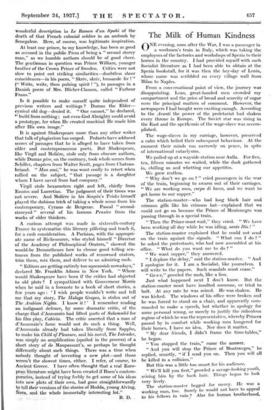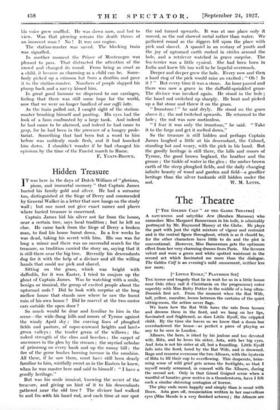The Milk of Human Kindness
ONE evening, soon after the War, I was a passenger in a workmen's train in Italy, which was taking the employees of the factories and workshops of Spezia to their homes in the country. I had provided myself with such Socialist literature as I had been able to obtain at the Spezia bookstall, for it was then the hey-day of Lenin, whose name was scribbled on every village wall from Milan to Naples. From a conversational point of view, the journey was disappointing. Lean, great-handed men crowded my compartment and the price of bread and scarcity of sugar were the principal matters of comment. However, the newspapers I had bought were exciting enough. According to the Avanti the power of the proletariat had shaken every throne in Europe. The Soviet star was rising in the East and the apoth2osis of the wage-slave was accom- plished. The wage-slaves in my carriage, however, preserved a calm which belied their subsequent behaviour. At the moment their minds ran narrowly on pence, in spite of international cataclysms. We pulled up at a wayside station near Aulla. For five, ten, fifteen minutes we waited, while the dusk gathered in, chilling us and whetting our appetites. We grew restless. " Why don't we go on ? " cried passengers in the rear of the train, beginning to swarm out of their carriages. " We are working men, corpo di bacco, and we want to get home to our supper." The station-master—who had long black hair and crimson gills like his crimson hat—explained that we could not go on because the Prince of Montenegro was passing through in a special train. " Then the Prince must wait," they cried. " We have been working all day while he was idling, santo Dio ! " The station-master explained that he could not send on the train against the signals. " What can I do ? "• he asked the protestants, who had now assembled at his. office. " What do you want me to do ? " " We want supper," they answered. " I deplore the delay," said the station-master. " And I apologize for it. I am a Socialist, like yourselves. I will write to the papers. Such scandals must cease." " Gr-r-r," growled the mob, like a lion. Just what happened next I don't know. But the station-master must have insulted someone, or tried to bolt. At any rate he was seized. He was shaken. He was kicked. The windows of his office were broken and he was forced to stand on a chair, and apparently com- manded to make a speech, but whether in apology for some personal wrong, or merely to justify the ridiculous regime of which he was the representative, whereby Princes passed by in comfort while working men hungered for their homes, I have no idea. Nor does it matter. " My dear friends, I didn't frame the time-tables," he began. " You stopped the train," came the answer. " And you will stop the Prince of Montenegro," he replied, smartly, " if I send you on. Then you will all be killed in a collision." But this was a little too smart for his audience. " We'll kill you first," growled a savage-looking youth, seizing him by the back hair. Things began to look very lively. The station-master begged for mercy. He was a Working man, too. Surely he would not have to appeal to his fellows in vain? Alas for human brotherhood. his voice grew muffled. He was down now, and lost to view. Was that piercing scream the death throes of an innocent man ? No ! It was our engine.
The station-master was saved. The blocking train was signalled. • In another moment the Prince of Montenegro was pleased to pass. That distracted the attention of the Crowd and changed its mood. From being as cruel as a child, it became as charming as a child can be. Some- body picked .up a crimson hat from a dustbin and gave it to the station-master. Numbers of people slapped his plump back and a navvy kissed him. • • In great good humour we dispersed to our carriages, feeling that there was still some hope for the world, now that we were no longer baulked of our cafe latte.
As the train pulled out, I caught sight of the station- master brushing himself and panting. His eyes had the look of a faun confronted by a large tank. And indeed he had cause to be alarmed, and indeed he had cause to gasp, for he had been in the presence of a hungry prole- tariat. Something that had been but a word to him before was suddenly made flesh, and it had knocked him down. I shouldn't wonder if he had changed his opinions by the time of the Fascist march to Rome.
F. YEATS-BROWN.











































 Previous page
Previous page